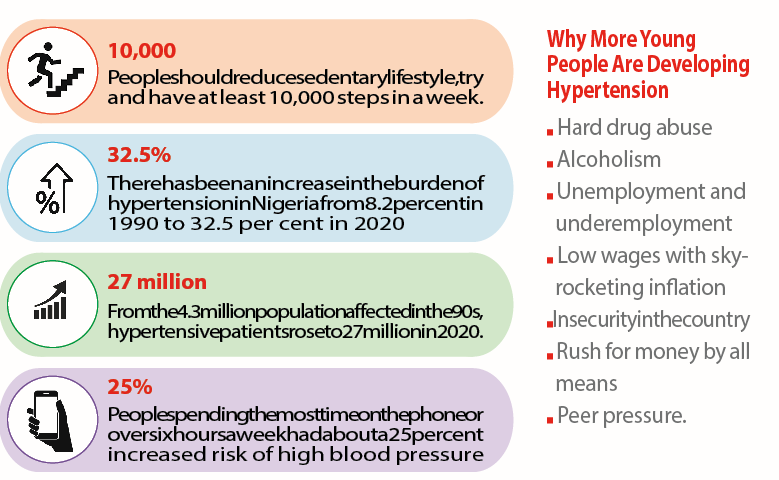With the rise in non-communicable diseases and sudden death, it is imperative for Nigerians to prioritise healthy living, experts have cautioned.
Unhealthy habits, according to medical experts, are detrimental to human health, as they identified some common unhealthy daily practices such as lack of physical activity, poor nutrition, smoking, excessive alcohol consumption, sedentary lifestyle, lack of sleep, stress and poor hygiene.
In today’s world, it is easy for people to get caught up in their daily routines and prioritise convenience and comfort over their health without knowing that the habits they adopt daily can have a significant impact on their overall well-being, a family health physician, Dr Innocent Okoro, told LEADERSHIP Sunday.
“From the foods we eat and the amount of physical activity we get to our sleep habits and the way we take care of ourselves, the choices we make can either support or harm our health, he said.
Buttressing this, the managing director, Society for Family Health, Dr. Omokhudu Idogho, said non-Communicable diseases such as hypertension, diabetes and pulmonary disease are particularly driven by lifestyle and habits people practice.
Idogho told this paper that lack of exercise is implicated in obesity, hypertensive heart disease, and diabetes, adding that smoking, including Shisha, is known to be implicated in a range of diseases, including cancers.
“Alcohol abuse can cause liver diseases and cancers. Indeed, in the food types and quantity, many of us are making ourselves sick. Appropriate weight management, exercising, cessation of smoking, and appropriate use of alcohol,” he said.
However, he said that the Society for Family Health is implementing a range of strategic intervention in the area of self-care where they work with communities to adopt, adapt and formalise more health supportive behaviour.
Also, a consultant family physician, University of Abuja teaching Hospital, Dr Chira Obiora, while stressing the need for Nigerians to practice healthy lifestyle, defined health as a state of complete physical, emotional and spiritual well-being and not just a mere absence of disease.
Wellness, according to Obiora, is close to that state of an individual being in a completely optimal state of health of an individual, both emotionally and spiritually, adding that a standard healthy state is an individual that has a normal body size.
He said “We advocate healthy lifestyles because a lot of things that we encounter in our daily occurrence contribute to disease that we can get, even chronic diseases, communicable and non-communicable diseases, and these things are the things that affect us daily.

“Our bodies are exposed to diseases daily and also our bodies are exposed to things that cause chronic diseases in our environments. Different stress causes situations like traffic, grief, things like office hustles, economic situations and even war in some places and civil unrest in some places. There are things that expose us to conditions that can trigger chronic illnesses.
“The way we live our lives matter. We should maintain good health hygiene or good sleep hygiene,” the physician told LEADERSHIP Sunday.
Cautioning Nigerians against unhealthy lifestyles, a consultant nutritionist, Nutrition International, Nigeria, Dr Bamidele Omotola, pointed out that the issue of lifestyle and health is very critical but a lot of people do not appreciate good health.
He said, “The issue of our diet is of importance because if you take the wrong food, you are likely going to be unhealthy. In these days and time, our cancer registry is growing by day, the issue of cardiovascular diseases is also increasing by the day, and sudden death is also on the increase.
Nutrition
Nutritionists have said that foods and beverages have significant impact on the health of an individual, adding that a diet high in processed foods, sugar, and unhealthy fats can increase the risk of obesity, heart disease, and type 2 diabetes.
They, therefore, called for incorporation of more fruits, vegetables, and whole grains into meals and snacks, saying fruits, vegetables, and whole grains are rich in nutrients such as fiber, vitamins, and minerals, and can help support good health.
Obiora urged people to take at least three litres of water daily, saying it helps the body’s water need and other things while also advising on low carbohydrate diets, low fat diets, and high vegetable foods, saying they help to reduce the energy consumed and also helps to lose the sugar content of the body.
Also, Omotola said with increasing knowledge, “We have found out that the type of food we eat also has importance in terms of how healthy we are. Some foods have been found to be casino genic, meaning they induce cancer. Unfortunately, these are the foods that are highly considered by most of us.
“Like the consumption of red meat, barbecue and beverages that are sugar sweetened, these are some of the things that relish. Also the issue of fast food: foods that contain trans-fat which the World Health Organisation (WHO) and many regulatory organisations have tried to control the consumption.”
The good news, however, is that some foods are known to be anti-cancer. According to Omotayo, fruits and vegetables are very good for our health, if you take it almost every day, you are able to prevent cancer because these fruits contain high fiber, particularly for men who are 50 and above, tomatoes also have some chemicals that are anticancer agents, consumption of garlic and onion are not just only to sweeten our food but also have chemicals that can fight cancer. We know about carrots. Carrots are also very important, it helps us to fight cancer , even lemon, lime and oranges. We are very blessed in Nigeria because these things are available
However, he said of an individual who has already come down with a disease like hypertension and diabetes, the person’s own dietary modification or lifestyle changes in terms of diet differs and for an individual who has not come down with these diseases, to prevent coming down with them, the person should have at least three litres of water daily, reduce egg intake, reduce fat and oil intake, reduce carbohydrate intake, eat more of vitamin rich foods, reduce salt intakes. “So these are the things that will help if one is doing,” he said.
Physical Activity
Regular physical activity is essential for maintaining good health and preventing a range of health problems, said Dr Obiora. However, many people do not get enough physical activity daily, leading to an increased risk of obesity, heart disease, and type 2 diabetes.
“We should try as much as possible to make sure that the energy we consume is match with the energy we burn, if we don’t do that, we just consume a lot of energy and we don’t have a way of expending that energy, we would be having energy surplus and it tends to build up in our body.
“Exercise is very important; we should be doing at least 30 minutes a day of jogging, brisk-walk for at least five days in a week for us to accumulate at least above 150 minutes of exercise in a week. That will help, then if we get more than that, better.
“The steps, let’s reduce the way we live a sedentary lifestyle, we should try and have at least 10,000 steps in a week. If we do that, at least it will show that we are active but for us to do the right thing, we should strive to see that we do more than 10’000 steps in a week, so the activity level is important and these are the things that help us to improve our cardiovascular health,” he urged.
Hygiene
Also, good hygiene practices, such as washing hands regularly and covering coughs and sneezes, are essential for preventing infections and other health problems. By being aware of these habits and taking steps to improve them, we can protect our health and improve our overall well-being. In the following sections, we’ll delve into each of these areas in more detail and provide tips for making healthy changes to our daily habits
Maintaining good hygiene, both oral hygiene and anal hygiene or perennial hygiene. “These are very important so we should endeavor to maintain these levels of hygiene,” said Obiora.
Stress
Stress has been identified as a major cause of ill health. Studies have shown that stress can cause headaches, upset stomach, elevated blood pressure, chest pain, and problems sleeping.
According to the chief executive officer, Childcare and Wellness Clinics, Dr Yashua Alkali Hamza, relaxation is essential, even as sudden deaths probably from sudden cardiac arrest or sudden rise in blood pressure are all stress related.
She said, “People have to try as much as possible to learn how to manage stress. Stress is by far the number one cause of ill health and it is not just about heart disease but any other illness.
“When you are under stress, your body strives to fight that stress and it diverts your immune system from fighting illnesses that they are supposed to fight. So if you don’t manage your stress and if you don’t take care of your stress levels, it is going to affect your health.”
She cautioned against consistent stressing of the body, saying it can pull the body off balance. “You should try as much as possible to relax and avoid stress. I know that things are difficult and I know that times are hard, but you have to take some time to take a deep breath in, bring yourself back into balance and try and manage that stress. All these sudden deaths, probably from sudden cardiac arrest or sudden rise in BP are all stress related, so managing your stress is very important,” he added.
Smoking/Alcohol
Similarly, smoking has been identified as a major cause of preventable illness and death worldwide. It is a leading cause of lung cancer and other respiratory diseases, as well as heart disease and stroke
Drinking alcohol in excess can lead to liver damage, addiction, and an increased risk of various cancers, including breast, colon, and liver cancer.
Excessive alcohol consumption can lead to a range of health problems, including liver damage, addiction, and an increased risk of various cancers. The National Institute on Alcohol Abuse and Alcoholism (NIAAA) defines moderate alcohol consumption as up to one drink per day for women and up to two drinks per day for men.
“For those who are smoking, smoking is a very dangerous habit that one can get engaged in. Also, if you must take alcohol, you shouldn’t do more than 21 units of alcohol in a week, that is like three bottles of beer in a week for a man, for a woman, it shouldn’t be more than two bottles in a week,” he added
Sleeping
Studies have shown that getting enough sleep is essential for our physical and mental well-being. Not getting enough sleep can lead to fatigue, poor concentration, and an increased risk of accidents, as well as long-term health problems such as obesity and type 2 diabetes.
Obiora said “We should be able to have at least up to eight hours of sleep in a day for an adult, if we are not having adequate sleep, it is going to affect us, so our sleep hygiene should be optimum, that should help to reduce our stress level and disposition to diseases both chronic diseases and also low immunity.”
A public health doctor, Dr Salau Adeeso, said there has been an increase in the burden of hypertension in Nigeria from 8.2 per cent in 1990 to 32.5 per cent in 2020. He said from the 4.3 million population affected in the 90s, hypertensive patients rose to 27 million in 2020. According to him, the fact that the disease is asymptomatic makes more than 29 per cent to be aware of the disease and 12 per cent on treatment.
A microbiologist, Dr Uche Uwajeh, said more people in their 20s are developing hypertension for the following reasons: hard drug abuse, alcoholism, unemployment and underemployment, low wages with sky-rocketing inflation, insecurity in the country, rush for money by all means, and peer pressure.
New research, published recently in the European Heart Journal—Digital Health, suggests a link between cell phone usage and hypertension—commonly known as high blood pressure. The study used data from 212, 046 people who were part of the UK Biobank, a commonly used data set in European-focused research. It further states that high blood pressure affects millions and is linked to a host of negative health outcomes including heart failure, heart attack, atrial fibrillation and stroke risk. More time on the phone linked to increased risk of high blood pressure
The researchers found more time on the phone every week was linked to increased risk of high blood pressure. People spending the most time on the phone or over six hours a week had about a 25 per cent increased risk of high blood pressure.





